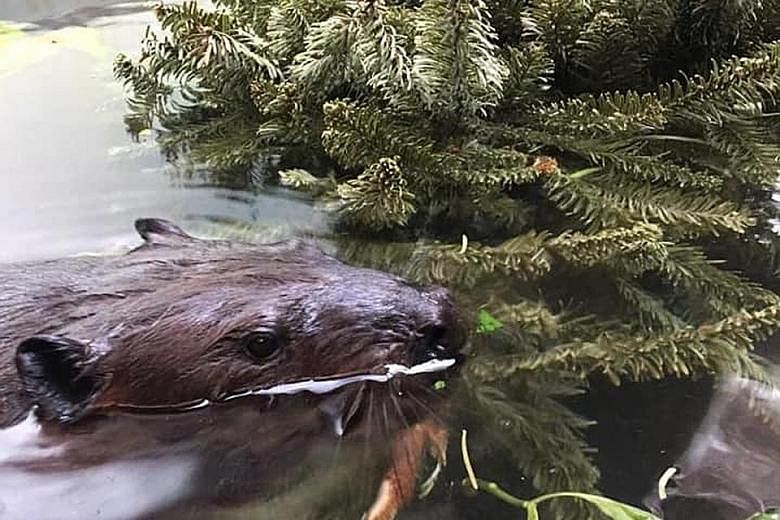Christmas might be over, but your real pine or fir trees could still be useful, at least for Justin Beaver and his furry pals at the Singapore Zoo and River Safari.
The Wildlife Reserves Singapore (WRS) has appealed to the public to drop off their live Christmas trees at the Zoo's open-air carpark from 9am to 2pm today.
The trees will give some of the animals at the Zoo and River Safari an avenue to explore new and unfamiliar objects, just as they would naturally in the wild.
The WRS told The Straits Times yesterday that this process, called animal enrichment, helps boost the animals' well-being. The WRS often uses natural materials, such as leaves and branches from trees in its parks, for animal enrichment.
Several WRS employees shared the appeal for Christmas trees informally in the past week, including veteran zookeeper Kumaran Sesshe, who wrote a Facebook post last Saturday from the perspective of River Safari star Justin Beaver.
"Hi, I'm Justin Beaver! My animal friends and I at WRS are always looking for something to gnaw, scratch, sniff and play with," he wrote.
He added that those with "real, lush and green" Christmas trees to spare after the festive season could donate them to the WRS.
ST understands that this initiative started on a small scale in 2017 for Christmas, but keen interest online has helped to spread the word this time.
The WRS said that when its staff noticed that many people were disposing of their trees after Christmas, they felt that these trees, with their pine scents, would make good enrichment devices for the animals. This is because the trees are something that they are not usually exposed to in captivity, the spokesman added.
According to American non-profit organisation Beaver Institute, beavers chew on wood to help keep their teeth sharp and prevent them from growing too long.
This is because beavers, just like all rodents, have teeth that do not stop growing.
A hard orange enamel on the front side of their incisors and a softer white dentine on the back enable them to sharpen their teeth as they chew on wood.
And as beavers chew, the softer part of their incisors tend to wear off faster, creating teeth with chisel-like cutting surfaces.
An ST report last month said that more people here are opting for a real Christmas tree in their homes. Nurseries noted an increase in sales in December, compared with past Christmases, which they attributed to more young families getting in on the tradition of buying a real tree. Some have also made the switch in a bid to reduce their carbon footprint.
According to the British environmental consultancy Carbon Trust, an artificial tree would need to be reused at least 10 times for its environmental impact to be lower than that of a real tree, which is used once.
How a fake tree is disposed of is also crucial. A 2m-tall real Christmas tree with no roots has a carbon footprint of 16kg carbon dioxide equivalent (CO2e) if it ends up in landfill, said the organisation. But an artificial one of the same height will leave around 40kg CO2e if discarded in the same way.
Some Facebook users have expressed interest in the WRS initiative, with a few suggesting they could arrange for a mover to transport the trees from their homes as a group.


